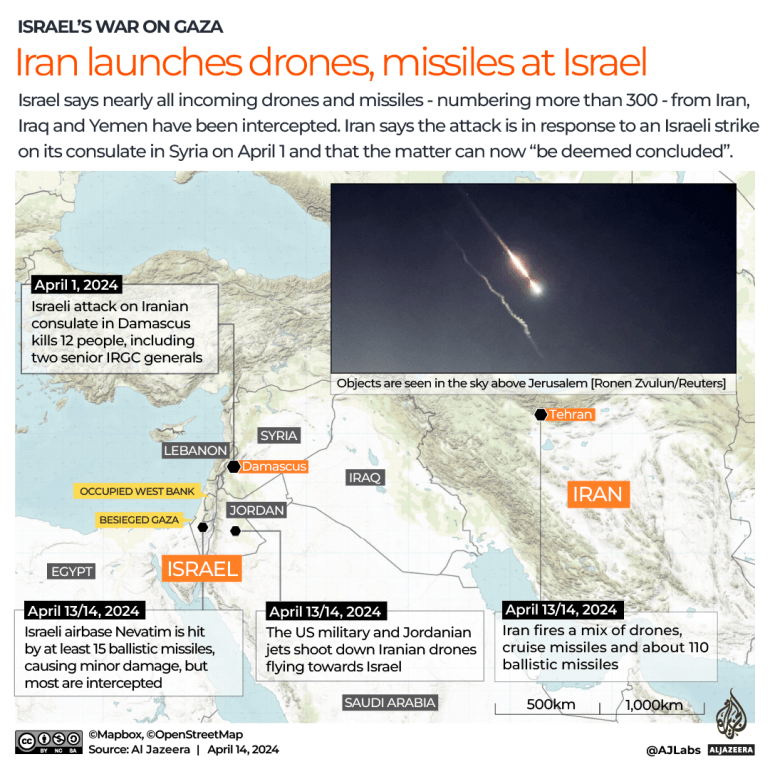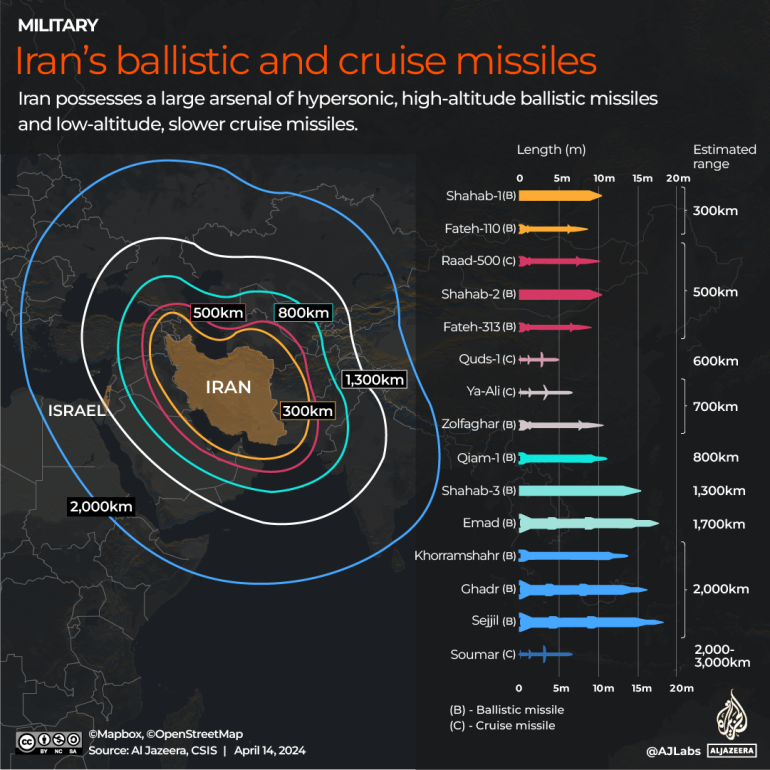Iran attacks Israel with over 300 drones, missiles: What you need to know
- Gerar link
- X
- Outros aplicativos
Iran has launched a massive aerial attack on Israel, two weeks after a deadly strike on its consulate in Syria.
Iran unleashed a barrage of missiles and drones on Saturday night and early on Sunday, targeting Israel in retaliation for April 1’s suspected Israeli strike on its consulate in Damascus, which killed 13 people.
Here is what happened and what analysts say could happen next:
What happened in Israel and when?
- Iran’s massive aerial attack marks the first direct strike by Iran on Israeli territory from Iranian soil. Iran called the attack Operation True Promise.
- The attack began on Saturday about 20:00 GMT. It lasted about five hours, according to United States officials.
- During the attack, explosions were heard in cities across Israel, including Tel Aviv. The explosions were also heard in Jerusalem, and air raid sirens sounded in more than 720 locations as Israeli forces sought to shoot down the projectiles.
- Israel’s chief military spokesman, Daniel Hagari, said Iran’s attack involved more than 120 ballistic missiles, 170 drones and more than 30 cruise missiles, according to a report by The Associated Press news agency.
- The Israeli military also said the vast majority of the projectiles were intercepted outside the country’s borders with help from the US, the United Kingdom and France. Jordan also shot down some of the missiles aimed at Israel as they were flying through Jordanian airspace.
- Israel’s military added that a “small number of hits were identified”. In a base in southern Israel, “minor damage occurred to the infrastructure”, it said.
- A seven-year-old girl was also severely injured by missile fragments while other patients sustained minor injuries and some were treated for anxiety.
- US Defense Secretary Lloyd Austin said on Sunday that the US also intercepted “dozens” of missiles and drones launched at Israel from Iraq, Syria and Yemen.
- j
Where exactly did the attacks take place?
- During the attack, Israel’s military ordered residents in the northern Israeli-occupied Golan Heights – near the Syrian and Lebanese borders – and in the southern cities of Nevatim, Dimona and Eilat to remain near bomb shelters.
- Nevatim is the site of an Israeli airbase while Dimona has a nuclear reactor on its outskirts. Eilat is Israel’s Red Sea port, which has suffered a sharp decline in operations because of repeated attacks by Yemen’s Houthis on ships using the waterway.

Why did Iran attack Israel?
- Iran carried out the attacks in retaliation for a suspected Israeli strike that killed an Iranian military commander, Major General Mohammad Reza Zahedi, in Damascus on April 1. He was killed along with six other Iranian nationals, including another general. At least six Syrian citizens were also killed.
- “It seems that Iranian leaders are determined to take action but also [be] seen to take action,” David Des Roches, an associate professor at the National Defense University in Washington, DC, told Al Jazeera.
- “What that indicates to me is that there are considerations of pride and prestige that are divorced from strategy and tactical utility that may indicate a more dangerous era than we thought,” he added.
- Hezbollah, a Lebanese armed group backed by Iran, and the Israeli military have been trading attacks across the Lebanon-Israel border since October 8, the day after the Hamas-led attacks in southern Israel and Israel’s brutal retaliation on the besieged Gaza Strip.
- On Saturday, Iranian state media announced that the armed forces had seized an Israel-linked container ship near the Strait of Hormuz.

What is the Israeli government saying?
Prime Minister Benjamin Netanyahu said Israel “will win” in a tweet after the attacks. Earlier, he spoke to the nation, stating that the military was prepared for any scenario.
- “Citizens of Israel, in recent years and especially in recent weeks, Israel has been preparing for a direct attack by Iran,” Netanyahu said.
- “Our defensive systems are deployed. We are ready for any scenario, both defensively and offensively. The State of Israel is strong. The [Israeli army] is strong. The public is strong.” He also thanked his allies, including the US and UK, for “standing alongside” Israel.
- Towards the end of Sunday, the Israeli war cabinet – comprising Netanyahu, Defence Minister Yoav Gallant, Minister Benny Gantz and several observers – met to discuss a response to the attacks but were divided on how and when to respond, according to media reports.
- A senior official from US President Joe Biden’s administration said Israel was not seeking to escalate the situation.
- “I think Israel made clear to us they’re not looking for a significant escalation with Iran. That’s not what they’re looking for. They’re looking to protect themselves and defend themselves,” the official said.
What is the Iranian government saying?
- Iran warned Israel against any response. The chief of staff of the Iranian armed forces, Major General Mohammad Bagheri, told state TV that if Israel retaliates, Iran’s response would be “much larger” than the overnight bombardment, according to a report by the Reuters news agency.
Iran also warned Washington that backing Israeli retaliation would lead to the targeting of US bases.
Earlier, Iran’s mission to the United Nations cited the UN Charter’s provision for self-defence under Article 51 and said the country considered “the matter … concluded”.
- “The matter can be deemed concluded. However, should the Israeli regime make another mistake, Iran’s response will be considerably more severe,” it said on X. “It is a conflict between Iran and the rogue Israeli regime, from which the US MUST STAY AWAY!”
- President Ebrahim Raisi issued a statement hailing the “brave men” of Iran’s Islamic Revolutionary Guard Corps who “taught a lesson to the Zionist regime”.
Conducted on the strength of Article 51 of the UN Charter pertaining to legitimate defense, Iran’s military action was in response to the Zionist regime’s aggression against our diplomatic premises in Damascus. The matter can be deemed concluded. However, should the Israeli…
— Permanent Mission of I.R.Iran to UN, NY (@Iran_UN) April 13, 2024
What could come next for Iran, Israel and the region?
- Gideon Levy, an Israeli journalist and author, spoke to Al Jazeera about what could come next and said that if Israel were to strike back, “we are facing a regional war.” It is a scenario he does not think will happen, especially, he said, “after the very clear and impressive aid of the United States to Israel”.
- “The extent of the Biden administration’s support means Israel will have to follow the US government’s advice not to retaliate after last night’s attack,” Levy said.
- “Netanyahu cannot attack Iran without the backing of the US and be exposed to a worse attack than last night,” he added.
- Separately, analyst and journalist Daoub Kuttab wrote that the exchange between Israel and Iran “has left the rest of the Arab world terrified of what another regional war could do to an already devastated region”.
- “And if it is to take place, there will be not just regional, but global repercussions,” he added.
- “Any regional Iranian-Israeli conflict will pull in the Gulf countries but also the US, Russia and China, creating a potentially explosive global confrontation.”
What are the international reactions so far?
- The aerial assault has drawn condemnation from Israel’s allies and warnings that it risked further escalation in the Middle East.
- Biden made clear that the US will not participate in any offensive operations against Iran, according to a senior administration official. But he reiterated his support for Israel.
- “Israel demonstrated a remarkable capacity to defend against and defeat even unprecedented attacks – sending a clear message to its foes that they cannot effectively threaten the security of Israel,” the White House quoted Biden as saying.
- The UN Security Council held a meeting and called on Iran and Israel to show restraint. “Neither the region nor the world can afford more war,” Secretary-General Antonio Guterres told the meeting. “Now is the time to defuse and de-escalate.”
- Jordanian Foreign Minister Ayman Safadi warned of the risk of a spillover conflict in the Middle East, stating that any escalation in the region would lead to “dangerous paths”.
Saudi Arabia’s Ministry of Foreign Affairs expressed concern over the “military escalation” and called for restraint from all parties.
- China also said it was deeply concerned about escalation, adding that it was a “spillover of the Gaza conflict” and a ceasefire should be implemented without delay.
- India also expressed concern and called for an “immediate de-escalation, exercise of restraint, stepping back from violence and return to the path of democracy”.
- After a meeting on Sunday, the leaders of the Group of Seven (G7) said: “We … unequivocally condemn in the strongest terms Iran’s direct and unprecedented attack against Israel.”
- The G7 said these actions “risks provoking an uncontrollable regional escalation. … This must be avoided. We will continue to work to stabilise the situation and avoid further escalation.”
- Gerar link
- X
- Outros aplicativos
.jpg)




Comentários
Postar um comentário